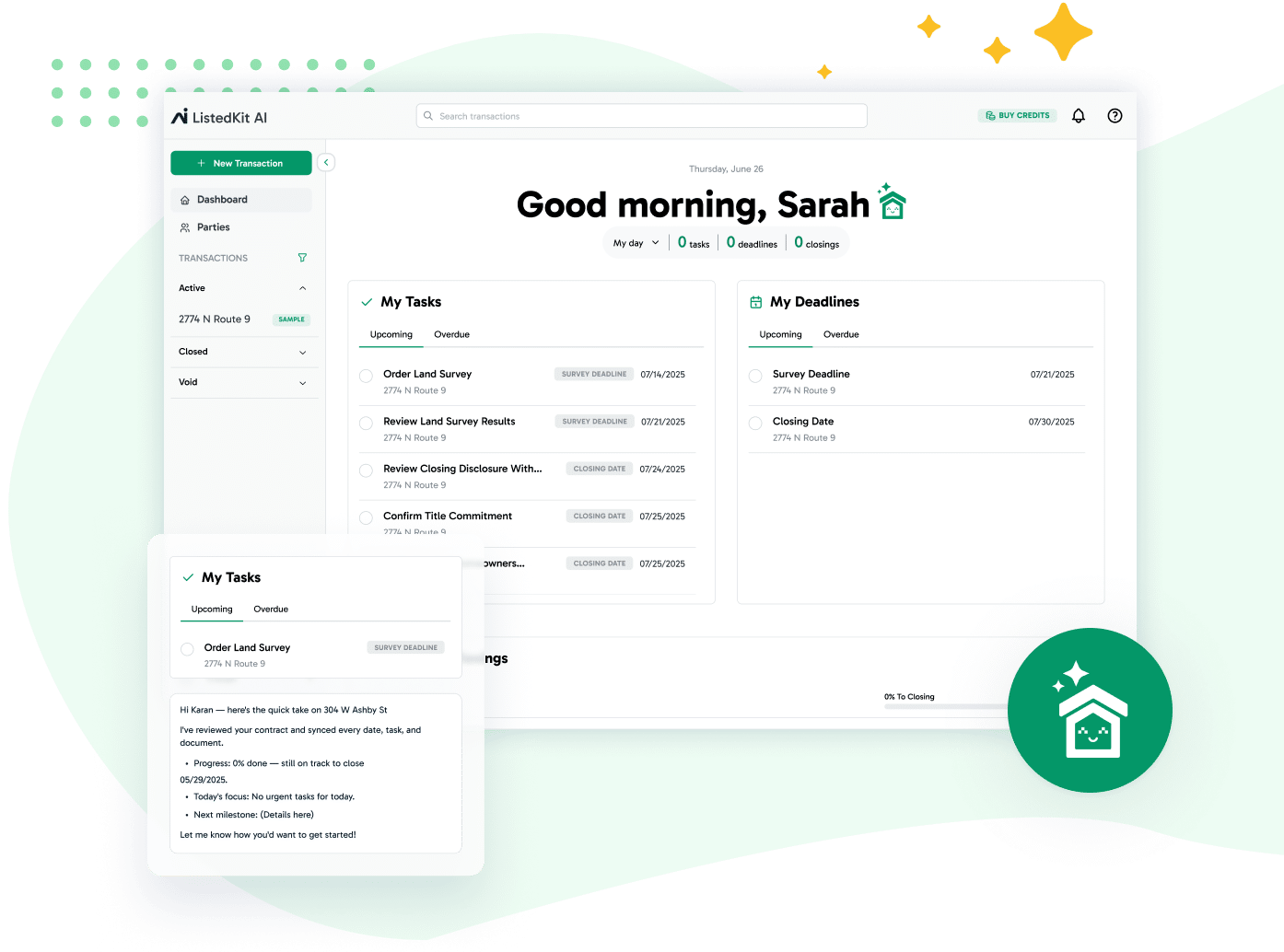For real estate professionals, Mondays are more than the start of the week—they’re a sprint to tackle the weekend’s transactions.
Transaction coordinators face a deluge of contracts and inquiries, making this time critical for staying ahead. However, while intended to foster alignment, Monday morning meetings often hinder productivity.
In this article, we’ll explore how Monday meetings derail progress, particularly for transaction coordinators, sales reps, and management teams, and provide actionable strategies to optimize workflows.
Why Mondays Are Critical for Transaction Coordinators
The weekend is the busiest period for the real estate sector. Open houses are held, buyers and sellers make decisions, and sales reps finalize deals. By Monday morning, transaction coordinators face a deluge of tasks, including:
- Processing contracts signed over the weekend.
- Responding to urgent client inquiries late Friday or over the weekend.
- Ensuring all contracts meet compliance standards with state and local transaction laws.
These tasks are time-sensitive. Missing a Monday deadline could mean delayed closings, frustrated clients, or even jeopardizing a deal.
Timing is critical in transaction coordination, and delaying essential tasks erodes trust with agents and clients who rely on smooth processes to move transactions forward.
The Risk of Falling Behind
Scheduling unproductive meetings during prime Monday hours compounds the challenges of managing the weekend surge. Coordinators and professionals often find themselves unable to:
- Submit contracts for compliance checks on time.
- Provide timely updates to agents, clients, or other stakeholders.
This delay creates a ripple effect. A Monday backlog forces coordinators to play catch-up throughout the week, leaving less time to address new tasks and maintain momentum.
A Real-World Example
Imagine you’re a transaction coordinator overseeing five transactions initiated over the weekend. On Monday morning, you have contracts to review, schedule inspection appointments, and prepare closing documents. You must also respond to multiple agent inquiries about financing deadlines and contingency removals.
Instead of diving into these critical tasks, you’re required to attend a two-hour team meeting. Updates that could have been sent via email were shared during the meeting. By the time the meeting ends, you’ve lost two hours of prime productivity and are now racing to process time-sensitive contracts before the end of the day.
This delay could mean that one agent doesn’t receive an update on their client’s financing approval until Tuesday, which pushes back the scheduling of appraisals.
The Hidden Costs of Monday Meetings
One study shows how meetings stop employees from accomplishing their work. This includes real estate professionals.
Let’s examine the effects of these meetings and how they impact real estate operations.
Lost Productivity
Monday mornings are often the most important window for addressing contracts, scheduling inspections, and processing the influx of weekend activity. Meetings during this time disrupt that momentum, causing delays in work that agents and clients depend on.
Key ways meetings interfere with productivity:
- Preparation consumes time. Writing agendas, reviewing transaction reports, and compiling updates take valuable hours away from actionable tasks.
- Interruptions to focus. Coordinators are pulled away from time-sensitive contract processing and client communications.
- Momentum loss. Even virtual meetings, while convenient, disrupt workflows, leaving less time to complete high-priority items.
Reduced Morale Across the Team
Meetings that provide little value or interrupt productive hours can be discouraging for transaction coordinators and their colleagues.
Constant interruptions leave teams feeling reactive and overwhelmed rather than in control of their workload.
Common scenarios that reduce team morale:
- Irrelevant updates: Meetings often include information that could have been shared through other channels, frustrating coordinators.
- Stress from incomplete tasks: When essential work is pushed back, it creates added pressure to finish everything quickly.
- Lack of engagement: Frequent, unproductive discussions sap energy and enthusiasm, particularly among those who rely on structured workflows.
For example, a coordinator who begins the day prepared to tackle weekend contracts may lose focus when they must sit through a lengthy meeting. When the meeting concludes, they are left scrambling to meet deadlines, leading to avoidable stress.
Cognitive Overload
Frequent interruptions and meetings can lead to mental fatigue, particularly on Mondays when workloads are heaviest. Without a clear path to prioritize tasks, transaction coordinators may feel overwhelmed.
Specific consequences of mental fatigue:
- Slower decision-making: Too many distractions make acting quickly on contract issues or client requests harder.
- Delayed progress: With attention divided, completing essential work takes longer.
- Increased stress levels: Constant task-switching between meetings and work creates unnecessary pressure.
Signs Your Monday Meetings Are Holding You Back
If you suspect that Monday meetings might be doing more harm than good for your real estate operations, here are some common indicators to watch for:
- Persistent Backlogs. Tasks from Monday frequently spill into Tuesday or later, delaying timelines for contracts, inspections, or closing preparations. This creates a domino effect that impacts the entire week’s workload.
- Agent Feedback. Agents express frustration about late contract updates, delayed inspection scheduling, or slower responses to client inquiries.
- Missed Deadlines. Transaction milestones, such as contract reviews, financing submissions, or contingency removals, are regularly delayed. This directly affects agent performance and client satisfaction.
- Engagement Gaps. Participants in Monday meetings appear disengaged, with little contribution or focus. This often happens when discussions are repetitive or lack actionable outcomes.
- Limited Post-Meeting Outcomes. After the meeting, there is little to no improvement in productivity or alignment. Instead, team members feel overwhelmed by the time lost and the backlog waiting for their attention.
For real estate professionals, these signs suggest you attend or conduct ineffective meetings.
How to Optimize Monday Workflows
Here’s how to restructure Monday workflows for maximum efficiency and alignment with your team’s needs.
Rethink the Necessity of Monday Meetings
Before scheduling a Monday meeting, evaluate whether it’s truly necessary. Ask yourself:
- Can the same information be communicated more effectively through an email update or a shared document?
- Are tools available to provide real-time visibility into tasks and deadlines for agents and clients?
For example, ListedKit AI offers powerful features that allow transaction coordinators to share real estate timelines, deadlines, and progress with all stakeholders.
Using a live dashboard, clients and agents can track milestones such as earnest money deadlines, inspection schedules, and closing dates without needing to reach out for updates. This eliminates repetitive questions and reduces the need for live meetings.
Batch Processing for Peak Productivity
Batch processing is a highly effective way to manage Monday workloads:
- Prioritize Contracts: Dedicate the first few hours of Monday to processing newly signed contracts from the weekend, ensuring time-sensitive tasks are handled promptly.
- Use Templates for Efficiency: Create reusable templates for common communications, such as responses to client inquiries or agent updates.
- Leverage Digital Tools for Focus: Some tools can help track and organize tasks, ensuring you work on high-priority items first without distraction.
For instance, a transaction coordinator might start the day by processing all contracts flagged as urgent and then move on to scheduling inspections or appraisals. Batching similar tasks together reduces mental switching and helps complete tasks faster.
Schedule Meetings Later in the Week
When meetings are necessary, consider moving them to Tuesday or Wednesday to allow Monday to remain action-focused. Midweek meetings are more effective for reviewing progress and addressing any issues arising from the week’s start.
Tips for action-driven meetings:
- Use tools to provide data-driven updates, ensuring meetings are focused on results rather than recapping the basics.
- Limit meeting time to 30 minutes to keep discussions concise and productive.
- Share agendas in advance to allow participants to prepare relevant insights or questions.
Alternatives to Traditional Monday Meetings
If eliminating Monday meetings is not feasible, consider these alternatives to maintain productivity:
Midweek Meetings for Strategic Alignment
Midweek meetings are particularly effective for entrepreneurial communication, enabling business owners to align goals without disrupting Monday’s critical tasks.
Leverage Technology for Efficiency
Tools like ListedKit AI and task management dashboards ensure the entire team stays informed without needing live updates. Virtual teams especially benefit from such tools, as they bridge the gap between remote collaboration and seamless workflows.
Adopt Asynchronous Communication
Recorded video updates or shared action plans offer flexibility while reducing time spent in live meetings. This approach works well for management teams overseeing large or distributed teams.
Reclaim Your Mondays for Maximum Productivity
Protecting Monday mornings is essential for transaction coordinators and real estate professionals to maintain productivity and ensure smooth weekly operations.
Addressing unproductive meeting habits and restructuring workflows can help you start the week more efficiently and stress-free.
Here are the important points to remember:
- Prioritize Workflows Over Meetings. Focus on actionable tasks such as processing contracts, responding to inquiries, and scheduling inspections to address the weekend surge effectively.
- Evaluate Meeting Necessity. Replace unnecessary Monday meetings with written updates or collaborative tools to keep everyone informed without disrupting productivity.
- Leverage Technology. Use tools like ListedKit AI to share real-time transaction updates, track deadlines, and reduce repetitive inquiries from agents and clients.
- Batch Tasks for Efficiency. Group similar tasks together to maintain focus and complete high-priority items faster.
- Reschedule Meetings. Shift team discussions to midweek for better alignment and more actionable outcomes.
Make your Monday workload ten times more manageable with ListedKit AI. Get started for free.




